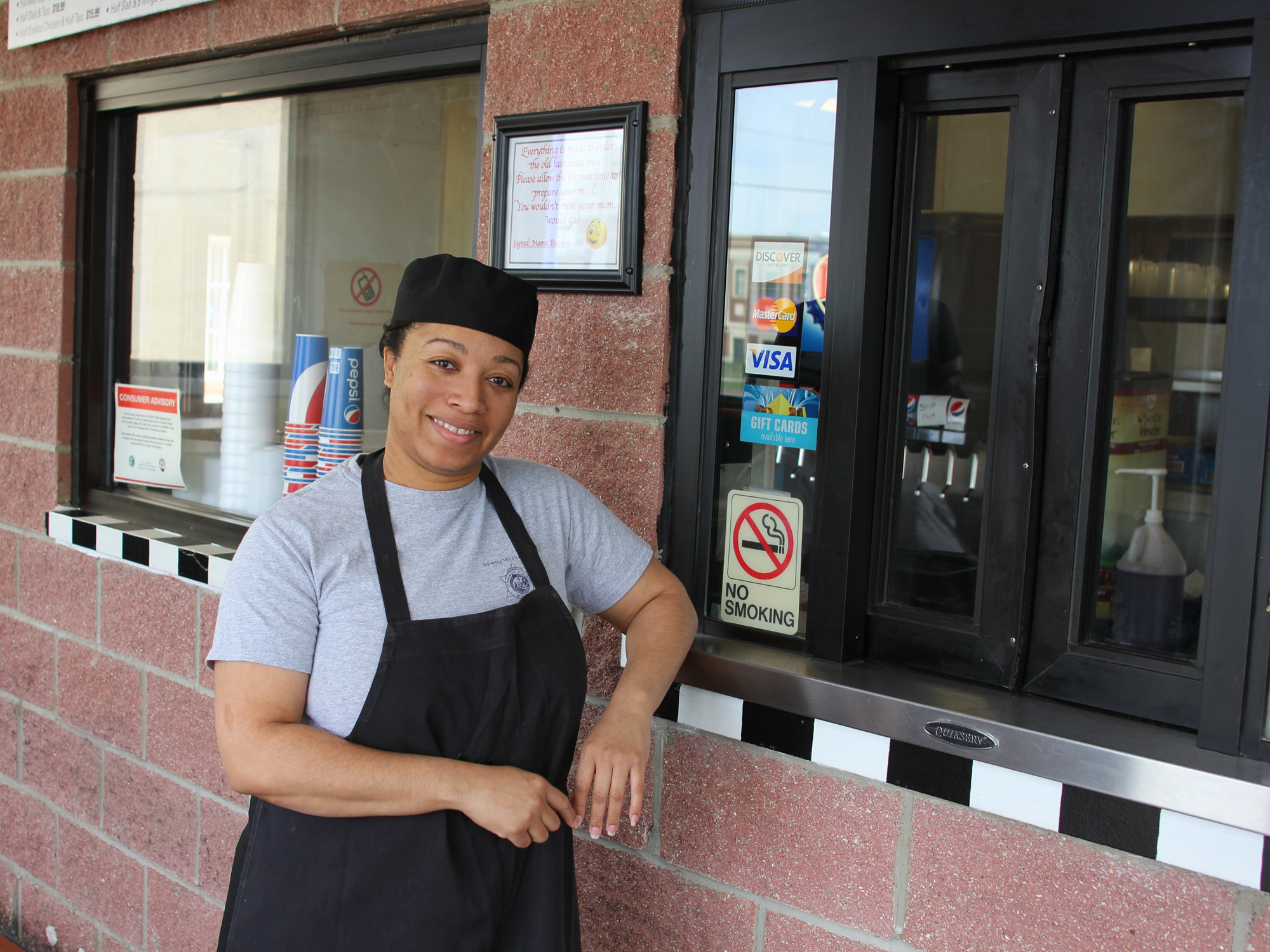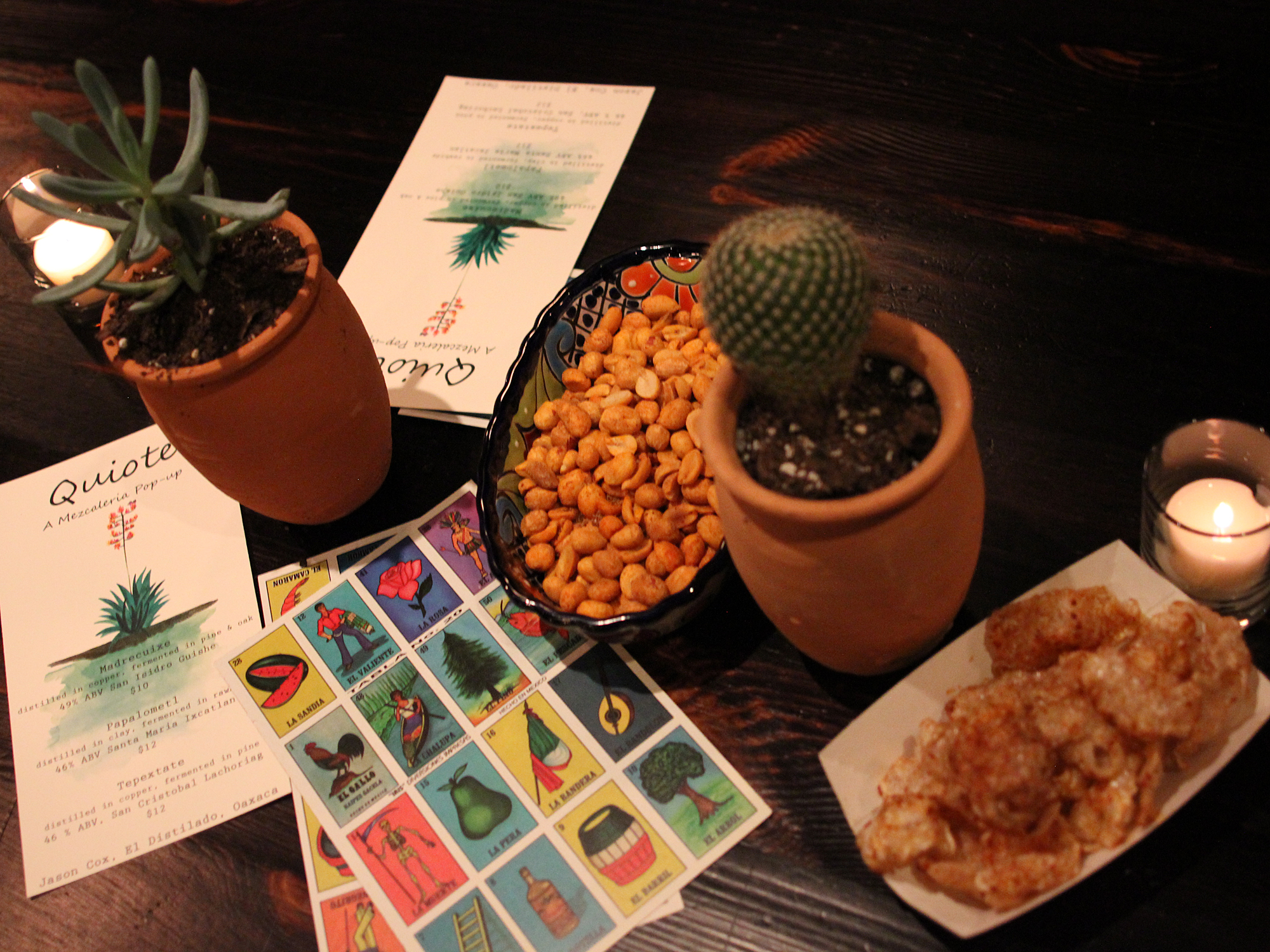SCOTT SHULMAN HAD NO IDEA what he was jumping into when he did a tasting for the owners of Andersonville’s Cantina 1910 in February. The 34-year-old chef was just looking for a chance to cook his own food and run a kitchen.
He’d recently been laid off from Dinner Lab, an organizer of pop-up dinners nationally that went belly up, and when he put his profile on the job-and-networking site Culinary Agents saying he was willing to move, Cantina 1910 was one of the restaurants that responded. As it happens, his last meal for Dinner Lab, featuring blue corn crêpes with turkey confit and mole, had gotten great reviews from a blogger, so he sent that along. A couple of phone interviews later, he found himself in Chicago preparing smoked trout ceviche, walnut salsa and roasted corn soup (his take on the street food, elote).
“I didn’t do any research in advance so I could go in fresh and cook what I wanted rather than what I thought they wanted,” Shulman says. But after the tasting, he did read the complaints from Yelpers, a November 2015 Reader piece decrying their behavior and stories about the dramatic December departure of opening chef, Diana Dávila. (Pastry chef Andrew Pingul and his team ran the kitchen after that.)
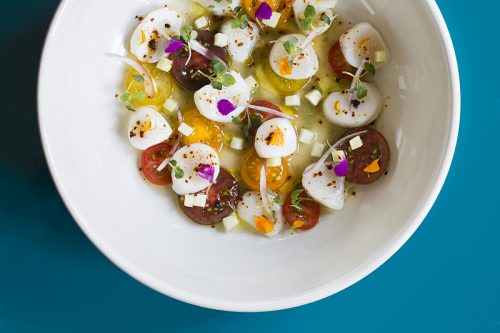 Grant Kessler
Grant Kessler Scallop ceviche
Shulman wasn’t daunted by the restaurant’s exceedingly well-publicized opening travails. When he was offered the job following a few more phone conversations, he snapped it up, and offically started as executive chef on April 1. “I didn’t know anything about the city, but the restaurant felt like it had a good family atmosphere with no prima donnas,” he says. “My goal is to win back the trust of the neighborhood.”
Shulman’s initial menu went into effect in late April, though it has a few holdovers from previous menus—the esquites, the chochoyotes, a couple of the tacos—and some other dishes have merely been tweaked. However, the lineup is so seasonal that he’s been trying out items that may turn up on the late summer menu, the first he considers truly his.
He’s also dedicated to local sourcing, one of the basic principles behind Cantina 1910 ever since Mark Robertson and Mike Sullivan’s Root Collective (Crew Bar + Grill, The SoFo Tap) opened it last September. Seventy percent of the ingredients come from within 200 miles of the restaurant, and some—microgreens, microflowers, tomatoes, peppers—have just been planted on the rooftop garden.
The chef works with about 20 farms, as well as shopping at the Green City Market. Produce comes from places like Stover Farms in Berrien Springs, Michigan, and Montalbano Farms in Sandwich, Illinois. Beef and pork are sourced in Iowa, Michigan and Illinois. The turkey (for carnitas) is from Ferndale Market farm in Cannon Falls, Minnesota; the chicken, from Miller Amish Country Poultry in Orland, Indiana, and some of the fish, such as the barramundi and sea bass, are from VeroBlue Farms in Webster City, Iowa. Shulman is planning relationship-building visits to as many farms as possible this summer.
 Grant Kessler
Grant Kessler Sea bass ceviche
The beautiful ceviches are typical of his style. For the sea bass ceviche, he marinates the fish in lime juice for just 10-to-15-minutes, then takes it out so its not too acidic. The sea bass is refrigerated until service, when it’s arranged in a bowl with fresh blackberries and diced peaches, ginger, serrano chiles and dots of jocoque cheese. For a little crunch, the dish is finished with micro cilantro and flowers from Urban Till in Chicago.
“I’d wanted to be a director, and being a chef isn’t that much of a departure: You take people on an emotional journey with you.”
The jocoque, which is like Mexican sour cream or crème frâiche, starts with heavy cream from Lamers Dairy in Appleton, Wisconsin, and is cultured in-house. Shulman says he saw the pastry chef incorporating it into desserts and got the idea of using it in ceviche from an experience he had while traveling in Peru. “Everwhere I went, I asked for recipes, and one ceviche vendor told me he marinated fish in lime juice for no more than nine minutes, then drained it and tossed it with a little condensed milk,” he recalls. “He combined it with local berries, and it was so simple and so refreshing, especially on a hot day with a chilled glass of white wine.” Adding that the jocoque has a mellowing effect like condensed milk, and local peaches stand in for mango, he says it’s all about balancing flavors and textures in every bite and making the dish look as beautiful and organic as he can.
The same principles apply to the one-page menu’s nine tacos (smoked local mushrooms, house-made chorizo, turkey carnitas, al pastor), a handful of small plates and nine large plates, among them banana-leaf-wrapped barramundi set off by tomato-tamarind salsa and hominy and Modelo-beer-braised short rib paired with refried lentils and charred scallion salsa.
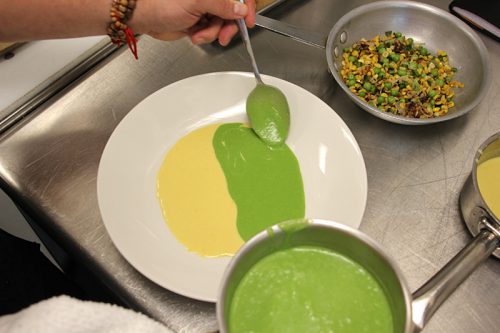 Michael Gebert
Michael Gebert SHULMAN WANTED TO BE IN CHARGE—but he didn’t always want to be a chef. Born and raised in San Diego, he was in his early 20s and studying film at a community college when he started cooking and paying attention to ingredients to encourage his aunt, who was undergoing treatment for breast cancer and had lost her appetite and lots of weight, to eat. In 2005, he moved to Los Angeles for the film and television program at California State, Northridge and began doing pop-up dinners, such as a tapas night, for 30 or 35 friends. He also was working at a small production company and wrote a few stories for One for the Table, an online magazine run by Amy Ephron (Nora’s sister).
“By 2008 or 2009, I’d gotten disillusioned with the Hollywood film scene and decided to make a go of it in food,” he says. “I’d wanted to be a director, and being a chef isn’t that much of a departure: You take people on an emotional journey with you.”
Shulman enrolled at the French Culinary Institute (now the International Culinary Center), moved to New York and was introduced to the possibilities of cooking. “I’d never had a cookbook. Then I opened ‘Noma’ in the library and saw how beautiful food could be and that restaurants all over the world were doing this,” he says. His first restaurant experience, a stage at Public, also was encouraging, because, he says, executive chef Brad Farmerie took the time to explain everything that went on, and made sure he tried the food he was helping produce.
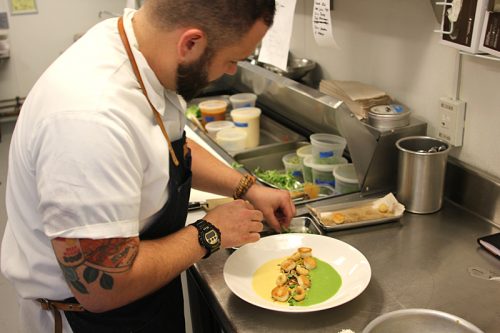 Michael Gebert
Michael Gebert Shulman graduated in 2010 and before leaving New York made a list of the places in Los Angeles he most wanted to work or stage: Providence, Hatfield’s, Mélisse, Joe’s in Venice, and Ortolan. He emailed all of them when he got back to San Diego, lined up a one-day stage at two-Michelin-star Providence and was offered a job on the spot—which he couldn’t take because they wanted him to start the next day, and he had no place to stay. “I didn’t want to lose any more opportunities, so I moved to L.A. and took a random apartment before setting up any more stages,” he says.
His next stage, at Hatfield’s, netted his first paying job, as garde manger, and he worked his way up to cooking in his year there. “I learned about quality and attention to detail—and how to think on my feet,” he says. “But I also remember getting yelled at a lot and feeling beaten down. I was looking for something else but promised myself that I’d never work anyplace for less than a year.”
The something else turned out to be Roomforty, a boutique catering company that does pop-ups and wine dinners, where he stayed slightly more than two years. But during a holiday break he saw a posting for a line cook at Mélisse, so he sent his resumé there and to Joe’s in Venice. Both offered him jobs, but he says taking the one at two-Michelin-star Mélisse was a no brainer that redeemed the lost opportunity at Providence. “I felt like I was in the big leagues and worked like I never had before,” he says. “Mincing shallots the first day took five tries and 30 minutes before I got it right. Nothing was ever good enough, You had to be perfect, the kitchen was so streamlined and nuanced. In my two years there I was becoming a better cook, though I didn’t realize it.”
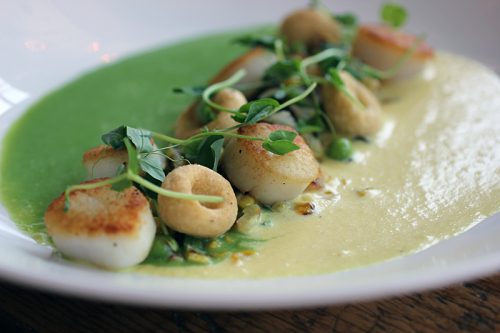 Michael Gebert
Michael Gebert Scallops divorciados
In 2014, Shulman staged for two weeks at Caelis restaurant in Barcelona with an eye to moving there but was unable to obtain visa sponsorship, so he returned to L.A. He wrote for food blogs, worked on a food and music cookbook, did demos at a cooking school and participated in a television cooking competition with a friend. “It was nice to step away from a professional kitchen for awhile,” he says of the period immediately before he got the job at Dinner Lab. At Dinner Lab he switched back into high gear: “I was pretty much opening and closing a restaurant for one night in a different city from week to week.”
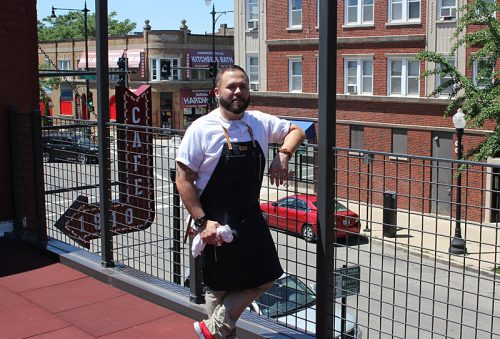 Michael Gebert
Michael Gebert SCHULMAN SAYS HE ALWAYS TRIES to take what he’s learned from past experiences to where he is now. At Cantina 1910, he plans to make 80 percent of the menu “relatable,” so neighborhood residents know they can come in an just have a good meal. But he wants to push boundaries with the other 20 percent, both to be a destination for people to try something new and to stretch himself as a chef.
He also wants to address the neighborhood’s concerns about the restaurant, starting with complaints about prices. The tab for a few of the large plates has been lowered a couple of bucks, and on June 23, he launched a mid-week three-course dinner for $25. It begins with a choice of wedge salad made with grilled baby gem lettuce and house-infused vinegars, roasted-chicken arroz con pollo or scallop divorciados, seared scallops with masa dumplings on a bed of corn, peas, peppers and cipollini onions wth fresh corn and pea sauces. You can order any main course (the Tres Mariscos and Short Rib are $10 extra) and finish with the churro, tres leches cake or Cherry Raspado, a refreshing mix of cherry ice, aronia (chokeberries), cherry chile syrup, rhubarb and condensed milk.
“It’s a nice way to sample the menu,” Shulman says, adding that he’s always testing new specials to see what works. “I’m a ‘why not try it’ person. Sometimes you fail, but if you don’t try, you never succeed.”
Anne Spiselman is a freelance writer who has covered food, wine, and culture for decades. She’s a frequent contributor to Crain’s Chicago Business and Edible Chicago and has written for most local publications and some national ones.
Latest
Join the Discussion
After you comment, click Post. If you're not already logged in you will be asked to log in or register with Disqus.





